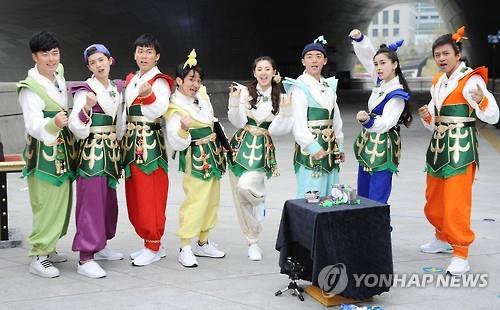- California Assembly OKs highest minimum wage in nation
- S. Korea unveils first graphic cigarette warnings
- US joins with South Korea, Japan in bid to deter North Korea
- LPGA golfer Chun In-gee finally back in action
- S. Korea won’t be top seed in final World Cup qualification round
- US men’s soccer misses 2nd straight Olympics
- US back on track in qualifying with 4-0 win over Guatemala
- High-intensity workout injuries spawn cottage industry
- CDC expands range of Zika mosquitoes into parts of Northeast
- Who knew? ‘The Walking Dead’ is helping families connect
S. Korean show’s popularity alters Chinese TV ranking
SEOUL, July 14 (Yonhap) — A popular South Korean variety show has bumped up the ranking of a Chinese television channel to No. 1 among entertainment broadcasters, data showed Thursday.
The Chinese version of “Running Man,” which centers on teams of celebrities competing to accomplish various missions assigned to them, has been broadcast by the Chinese TV network Zhejiang under the title “Hurry Up Brothers.”
According to second quarter data on the top 10 Chinese TV channels for entertainment programs, Zhejiang took the top spot with 1.4 percent, beating rival Hunan TV, which came in at 1.1 percent.

This photo, provided by the Seoul metropolitan government, shows the shooting of “Hurry Up Brothers,” the Chinese version of the popular South Korean variety show “Running Man.” (Yonhap)
“Zhejiang TV began to show signs of catching up with Hunan TV after airing ‘Hurry Up Brothers,’ and the recently announced second-quarter rankings show that it won a clear victory over Hunan,” the Beijing office of the Korea Creative Content Agency said.
Co-produced by Zhejiang and South Korean broadcaster SBS, “Hurry Up Brothers” first aired in October 2014. In a country with more than 2,000 TV channels, a 1 percent viewership is considered a barometer of popularity, a rating the show easily surpassed in its first season.
During its second season, viewership rose to 5 percent, while in the second quarter of this year, Season 4 averaged a 3 percent viewership, the highest for an entertainment program in all of China.
An SBS official earlier said the program has generated a significant amount of income for the broadcaster as the company shares the profit from “Hurry Up Brother” with its Chinese partner.
The top ad spot for Season 4 of “Hurry Up Brothers” came with a price tag of nearly 150 billion won (US$131 million).
Whether the show’s popularity will last is uncertain, however, as the Chinese government introduced new broadcasting regulations in July allowing only one reality show season per TV network a year.
Zhejiang originally planned to air Season 5 in the latter half of this year but is expected to postpone the schedule to next year due to the new regulations.








![일본 사도광산 [서경덕 교수 제공. 재판매 및 DB 금지]](http://www.koreatimesus.com/wp-content/uploads/2024/07/PYH2024072610800050400_P4-copy-120x134.jpg)


